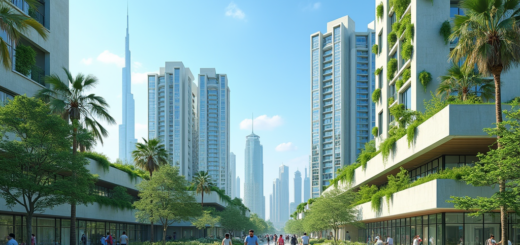The Role of Dubai’s Property Market in Supporting Business Growth
Dubai’s property market plays a pivotal role in fostering business growth. The emirate has established itself as a global business hub, attracting entrepreneurs and corporations alike. With its strategic geographic location, robust infrastructure, and favorable business regulations, Dubai’s real estate sector significantly contributes to the sustainability and expansion of various industries. This article will delve into the critical aspects of Dubai’s property market and its impact on business development, examining how real estate investments provide invaluable opportunities for growth and innovation.
Key Factors That Make Dubai’s Property Market Attractive

Dubai’s property market has become a magnet for businesses for several reasons. First, the emirate boasts an advantageous geographical position that connects Eastern and Western markets efficiently. Second, the investment-friendly regulations allow 100% foreign ownership in designated free zones. Additionally, low tax rates, including no income tax, make Dubai financially appealing to business owners. Here are some of the key factors that make this market attractive:
- Diverse Property Options: From luxury commercial spaces to affordable office units, Dubai offers a wide range of real estate opportunities.
- High Return on Investment: Real estate in Dubai generally offers lucrative ROI, encouraging investors to enter the market.
- Access to Global Markets: Its strategic location facilitates trade and commerce with different parts of the world.
- Innovative Infrastructure: Cutting-edge development projects and city planning promote business efficacy.
- A Supportive Business Environment: Business-friendly regulations and resources make the entire setup seamless for new ventures.
The Link Between Real Estate and Economic Growth

The interconnectedness of the real estate sector and the broader economy is evident in Dubai. The property market serves as a catalyst in boosting economic growth by attracting foreign investments and creating job opportunities. Real estate developments lead to an influx of businesses, which ultimately enhances the employment sector. This symbiotic relationship not only stimulates the local economy but also elevates Dubai’s status on the global stage. Moreover, successful property developments often pave the way for subsequent projects, leading to a cycle of growth and improvement. Such positions create a thriving ecosystem that encourages entrepreneurship and innovation.
Real estate development in Dubai is closely tied to expanding business opportunities. The construction of commercial spaces, retail outlets, and entertainment venues fosters a conducive environment for various activities. Here are essential ways real estate development translates to business prospects:
- Business Incubation: Real estate developments often create incubator spaces for startups.
- Networking Opportunities: Proximity to other businesses enables valuable networking and collaboration.
- Increased Consumer Base: More businesses and developments attract a larger customer demographic.
- Enhanced Brand Visibility: Strategic locations in high-traffic areas boost visibility for businesses.
- Innovative Partnerships: Collaboration between property developers and businesses leads to unique projects.
Challenges Facing Dubai’s Property Market
While Dubai’s property market holds significant potential for business growth, it also faces challenges. The global economic climate continually influences investment decisions, and periods of market fluctuation can create uncertainty. Additionally, competition among real estate projects can lead to oversupply, thereby negatively impacting rental yields and property values. Regulatory changes or macroeconomic shifts can also affect investor confidence. It is crucial for businesses entering this market to conduct due diligence and stay informed about market trends to navigate these challenges effectively.
Conclusion
Dubai’s thriving property market is essential for business growth and economic sustainability. The emirate’s unique advantages, including its strategic location, diverse property options, and favorable regulations, create myriad opportunities for entrepreneurs and corporations. However, navigating the potential challenges is crucial for optimizing success within this vibrant market. Ultimately, by leveraging the unique strengths of Dubai’s real estate sector, businesses can achieve sustainable growth and become part of the emirate’s flourishing economy.
Frequently Asked Questions
1. What types of properties are available for businesses in Dubai?
Dubai offers a range of properties for businesses, including office spaces, retail shops, warehouses, and co-working spaces. Each type meets different business needs and targets various market segments.
2. How does Dubai’s property market support startups?
The property market supports startups by providing affordable co-working spaces, incubators, and networking opportunities, fostering an environment conducive to innovation and collaboration.
3. Are there any restrictions on foreign investment in Dubai’s property market?
While there are restrictions for purchasing property outside designated areas, foreign investors enjoy 100% ownership within certain free zones, allowing them significant control over their investments.
4. What impact does the property market have on job creation in Dubai?
The development of new real estate projects creates numerous job opportunities across various sectors, including construction, sales, and property management, thus enhancing the employment rate in the emirate.
5. How can businesses mitigate risks in Dubai’s property market?
Businesses can minimize risks by conducting comprehensive market research, seeking professional advice on property investments, and staying informed about current economic trends that may affect the market.







